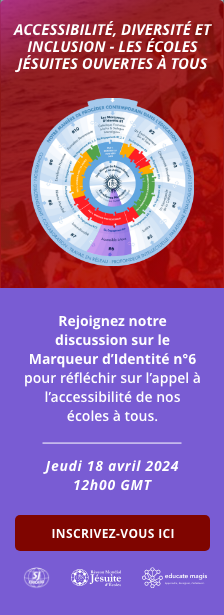Recently, during a Zoom prayer service at our school, a colleague, Robin Walters, Freshman Guidance Counselor at the school, shared a reflection on the joys and sorrows of racial justice growing up on the East coast of the US and now working at a Jesuit H.S. in the Northeast. It was a really powerful message and well delivered to our school community members.
Afterwards, we thought it might be something that our colleagues across the network might enjoy/benefit from reading – particularly in the U.S., but also across the global network.
Racial Justice Reflection
Good afternoon Prep community. I’m grateful that we are able to come together like this in shared prayer and reflection. Before I begin today’s reflection, let’s take one minute of silence to remember the victims who have died from Covid, their grieving loved ones, and our nation as we struggle with and suffer from the racial, social, and economic upheaval facing us right now.
(One minute of silence)
Today’s scripture reading is from Philippians 4: 4-9 and Mark 4:30-32.
Right now our country is in upheaval at a level of intensity that we have not seen so widespread in a long time. For a couple of generations, this is the first time. It is easy to look at this moment and both wonder at how quickly things can change and also sorrow at what things seem to not have changed enough. We are wrestling to acknowledge, understand, and change our country’s relationship with racial inequality and injustice. So many conversations are happening within our communities, including the Prep community, that are leading to more exploration and reflection but also to intense anger, confusion, and sometimes division. The array of emotions I feel from a day to day basis is sometimes staggering and I know that I am not alone in that. What does this all mean? Will change even come from all of this?
Jesus says in the parable of the mustard seed that the kingdom of God is like the smallest seed, the mustard seed, which once sown grows into a large and mighty tree with enough shelter to sustain. It’s powerful and enticing that Jesus describes this community of God’s as beginning from the smallest of seed. We often despair at the smallest of things from a simple ingrained idea that small is not good enough. Not strong enough. Small won’t get enough of the job done that we need done. We are in a moment in our lives, when the struggle for racial equality is making many of us feel hopeless and as though the movement so far hasn’t produced enough change. The emotions are heavy – bitterness, anger, confusion, and, for some, an intense rage born from a feeling of helplessness. With those emotions swirling around us like a hurricane, it’s hard to listen and lean into what Jesus is telling us about how to see this work of racial justice and have faith that, not only has work been done but there’s so much more that can still be done.
My own family history is a testament of the parable. I come from a long line of Christian believers born and raised in segregated Jim Crow southern states. My grandmother was born in 1926 in eastern shore Maryland and worked as a domestic in white people’s homes, raising ten children in poverty, and didn’t know a desegregated world until she was well into adulthood. Legalized and socialized racial inequality was her reality. My mother, born in 1946, spent the early years of her education in segregated schools in a segregated small town. The separation is so embedded that to this day, there is still a white side of town and a black side of town. My father was born in 1936 and raised in South Carolina until he was 12 then, like many many Black Americans, due to the intense injustice, racialized terrorism, and lack of opportunities for Black people moved to Washington DC. Neither my mother, father, nor grandmother were social justice warriors. They weren’t protestors, marchers, or fighting for the right to vote. It is easy, in this moment when so much of our attention is on grand scale actions demanding large scale actions and think that’s the only way change can come about. But then I am reminded that my parents, like most people, sowed small seeds that have been growing, and continue to grow into strong trees just by making small strides in their everyday lives. My grandmother sowed faith into her children, dignity, and a belief that they could do better than she can no matter what the messages coming from this country were telling them. My mother would go on to have a successful career in government, join the middle class, live in a majority Black middle class community, and send two of her children to college. The evidence of progress is not found just in what laws and policies are put into place, though that is important. But sometimes the measure of progress, of change, the evidence of God’s hand in the work, comes from the day to day small changes from generation to generation. In this mundane, normal family history, I can see past the hopelessness of the largeness of the problem and see that evidence of progress was right there in the people I descended from and who raised me and right here in me, the tree grown from those small seeds planted generations ago.
Last month me and a friend were talking about how big and deep the problem of racial inequality is and how it seems impossible to end it even though it’s causing so much pain; we both wondered how we’d ever actually heal this mess. Like many right now, we just felt so overwhelmed. In the middle of the conversation the parable of the mustard seed popped into my head. (for such a small verse it applies to so much). This work, of racial inequity and racial reconciliation is like the mustard seed- small movements, small moments, small efforts, grow into big outcomes that sometimes seem impossible when your eyes can only see the big hurdles. The work that has been done, the changes wrought, makes the life of a black woman born in 1982 much different and more free than a woman born in 1926. I can testify that hope can manifest even when it seems like it’s impossible to change the brokenness that is caused by racial inequality in our country and communities. We have and can continue to progress no matter the hurdles and resistance. .
Philippines 4:7 says – “And the peace of God, which surpasses all understanding, will guard your hearts and your minds in Christ Jesus”. Racial justice work demands a lot of emotional energy and can easily lead to exhaustion and compassion burnout. The peace of Jesus that Paul is speaking to us about, is the antidote to the emotional burnout, freely given and in abundance if we seek it. This foundation of peace and safety of the mind and heart allows us to go into this work individually and as a community; protecting us when it becomes too much. And sometimes, in the midst of doing this work, it will feel like it’s too much. But there is a gift of peace and we are encouraged to reach for it. Unlike us, it never runs dry.
Most of us will never be cultural superheroes in the fight for racial justice but we don’t need to be in order for our actions to have super hero effects. God gives a roadmap for our approach to this work in Philippians 4: 8-9. The Word urges us to think about, learn, listen, and practice what is honorable, what is just, pure, lovely, what is worthy of praise. From these things comes that peace promised by God that surpasses all understanding and gives us the strength we need to continue on the work. As we focus on these good attributes, we are led back to God, allowing us to center Him in this difficult and painful work of racial justice. From Him comes the strength to stay hopeful, to see the fuller picture when our view is clouded by the disappointments and regressions that come when we try to tackle the deep root of racism in this country. Through God, there is no hurdle that cannot be overcome even hurdles caused from centuries of systematic racial injustice and oppression.
We, the Prep community, have a lot of work we need to do, can do, and have done. Each of us individually have the power to fight for racial justice by taking action to do whatever we can do. Everything counts towards the goal. God is a God of justice; He is in this fight for equality and justice with us. He has made each of us capable of purpose and action.
Let me end with a quote from an actual cultural superhero, the late John Lewis:
Ours is not the struggle of one day, one week, or one year. Ours is not the struggle of one judicial appointment or presidential term. Ours is the struggle of a lifetime, or maybe even many lifetimes, and each one of us in every generation must do our part. »
In Jesus name, I lift us up in prayer that He would center Himself in our purpose and guide us in His peace,
Amen
To download the Racial Justice Reflection as a document please click here
Se connecter ou Adhérer
pour créer et afficher des commentaires

